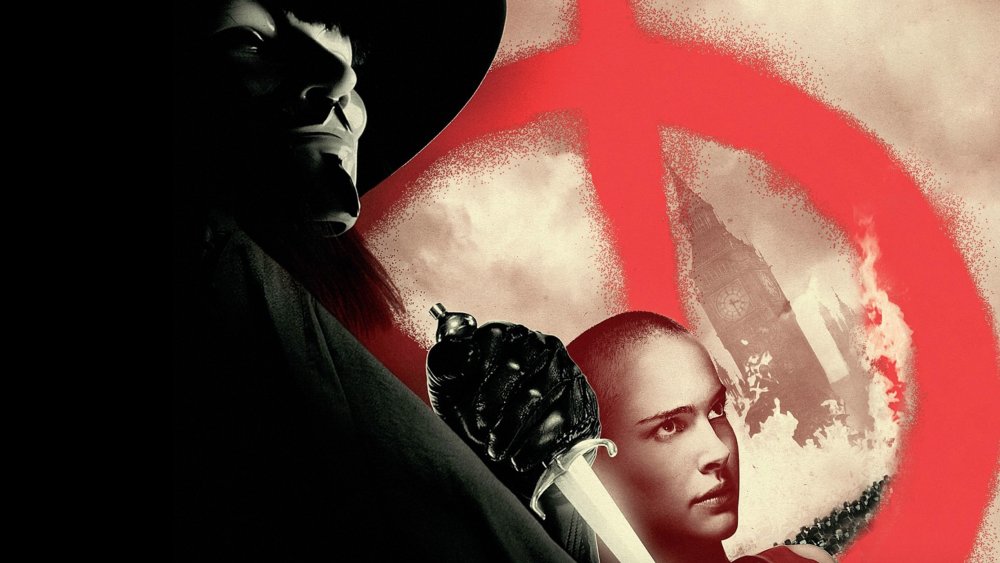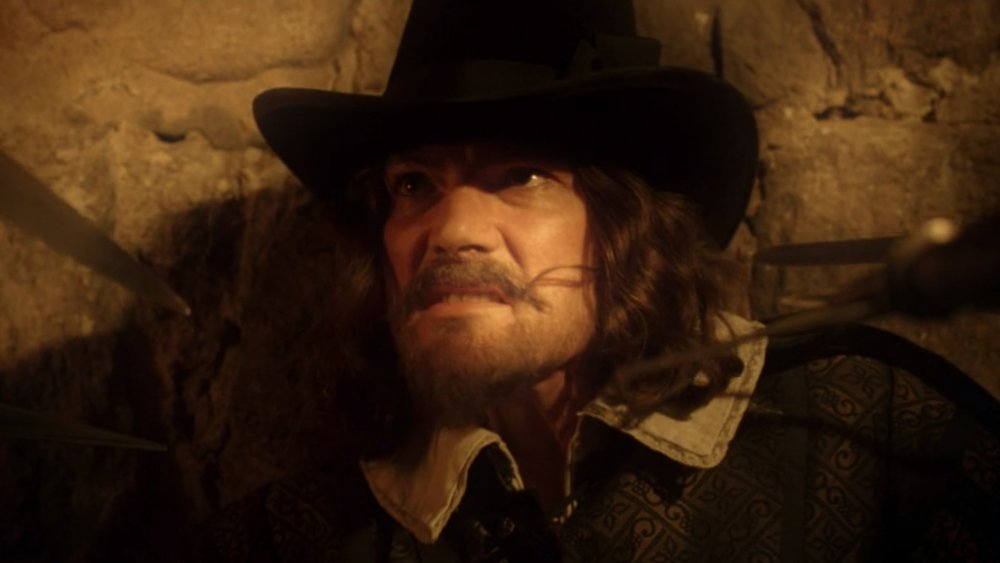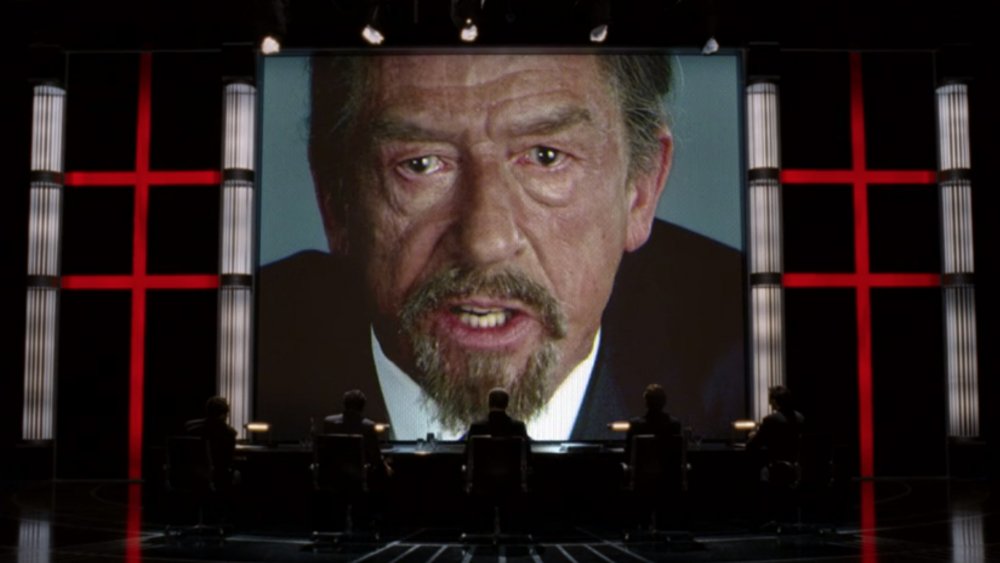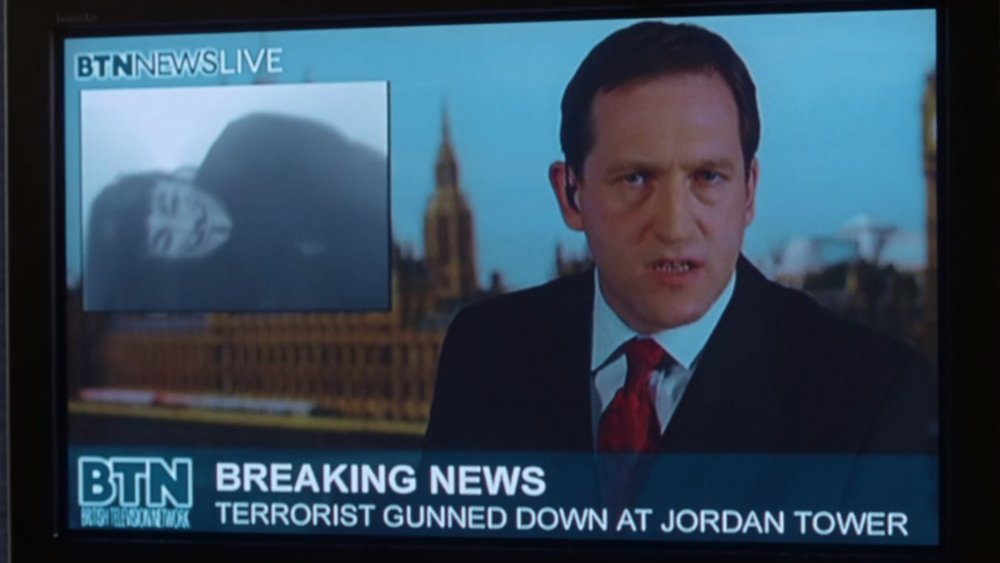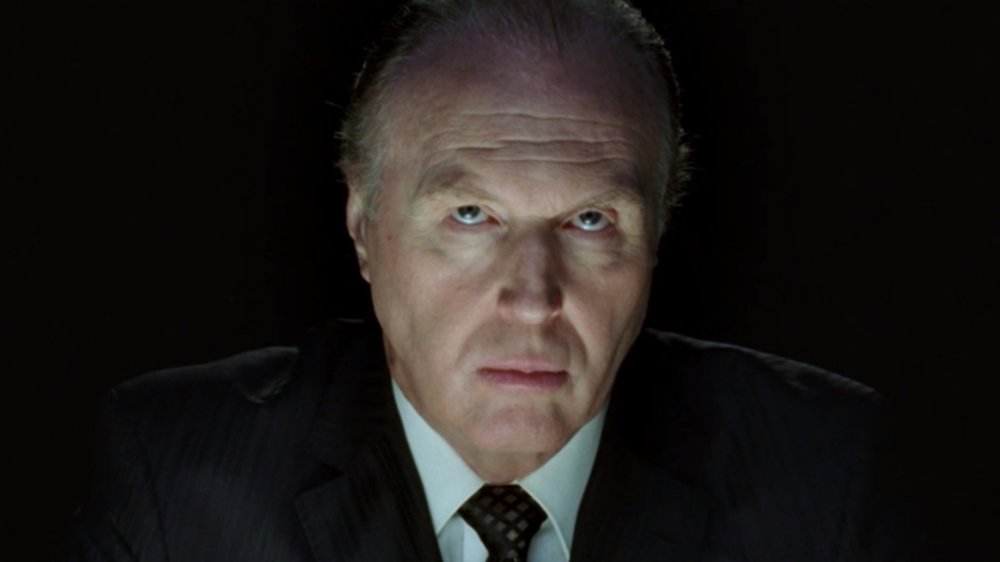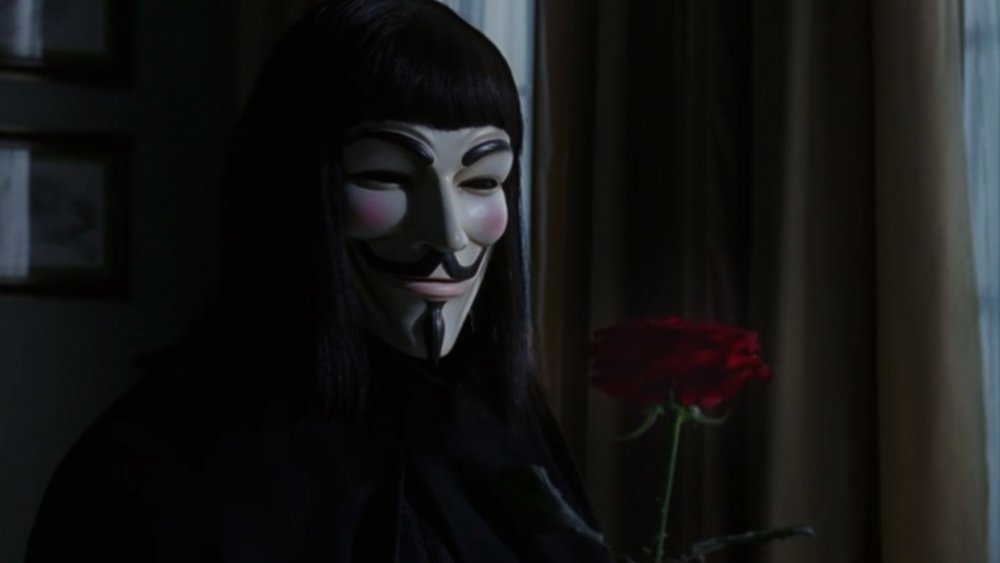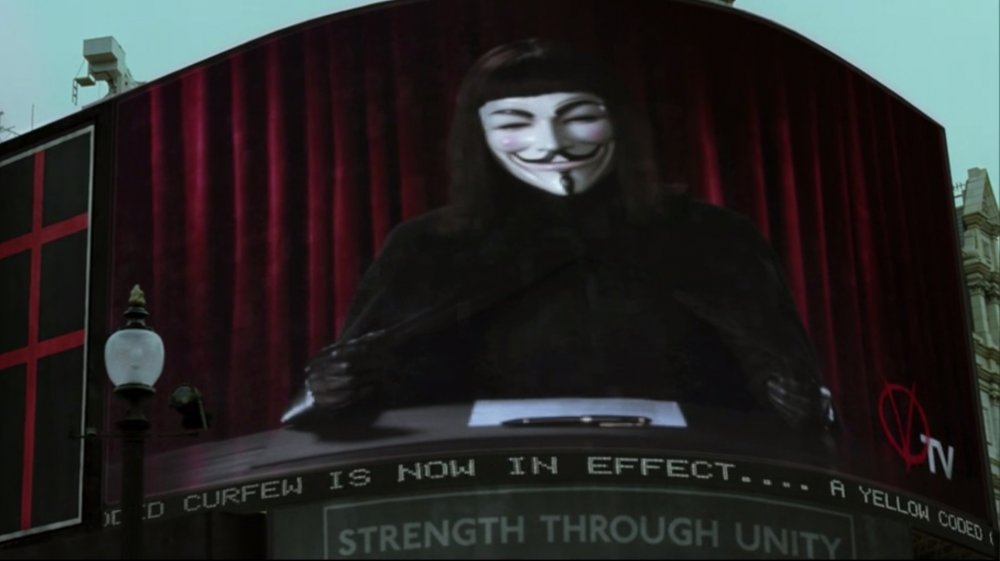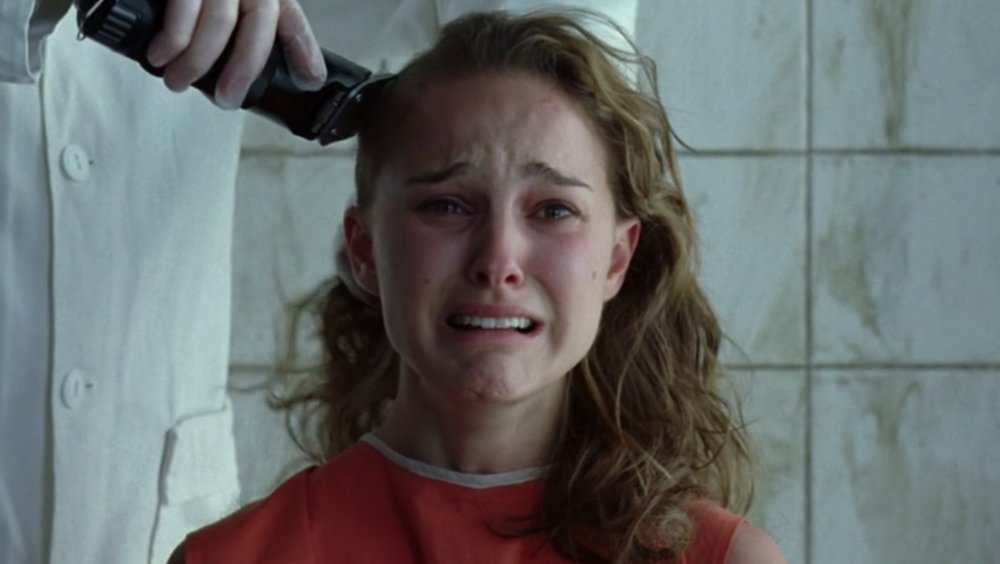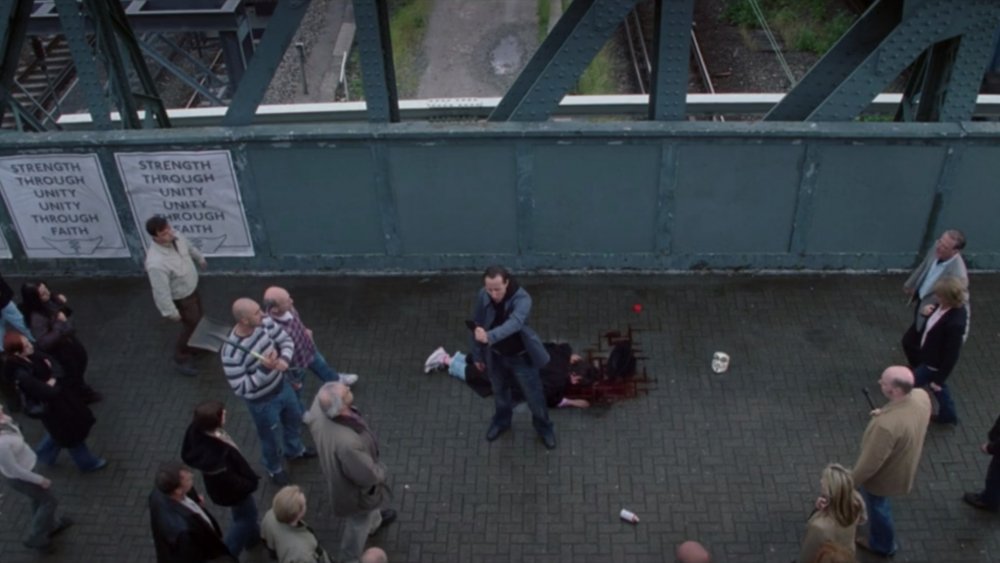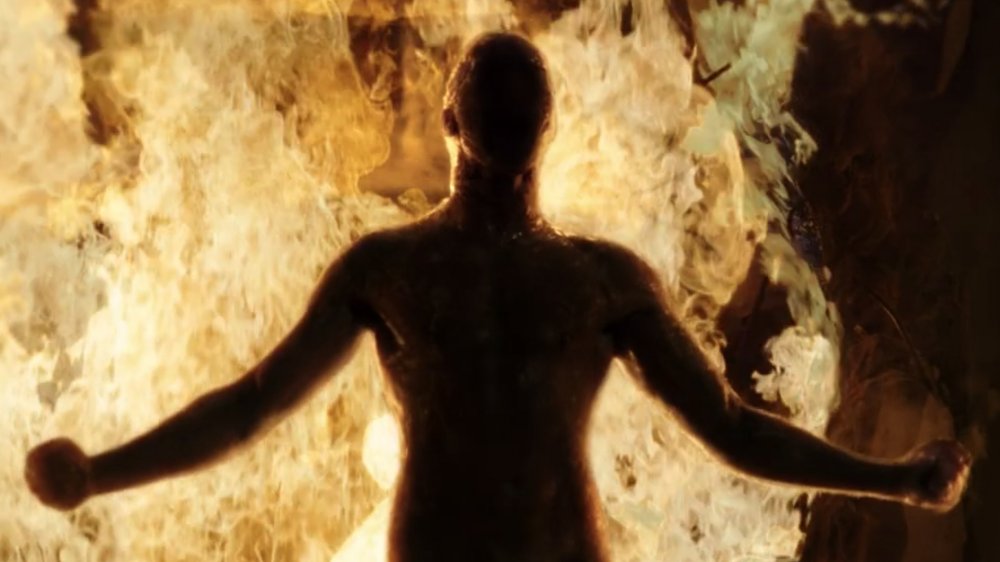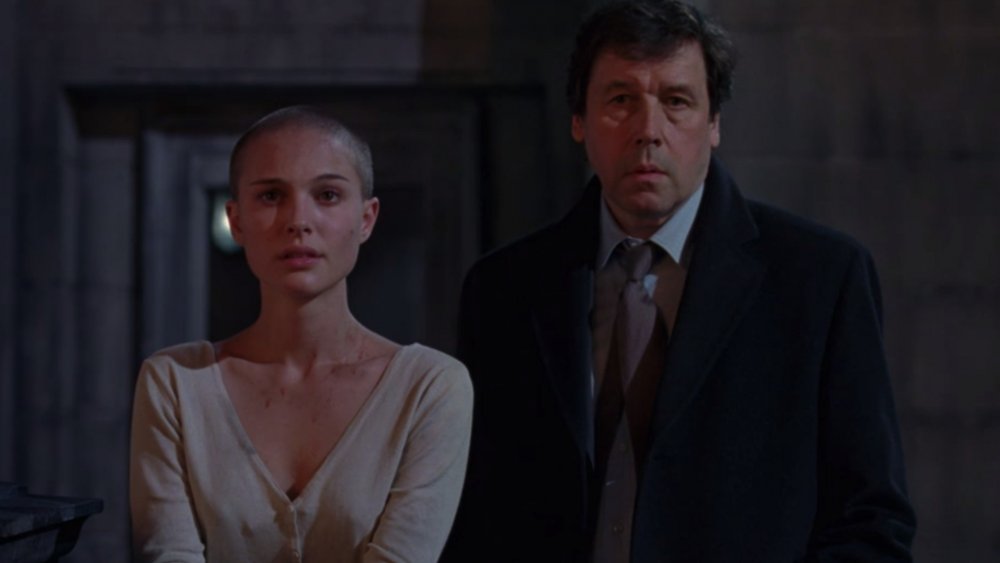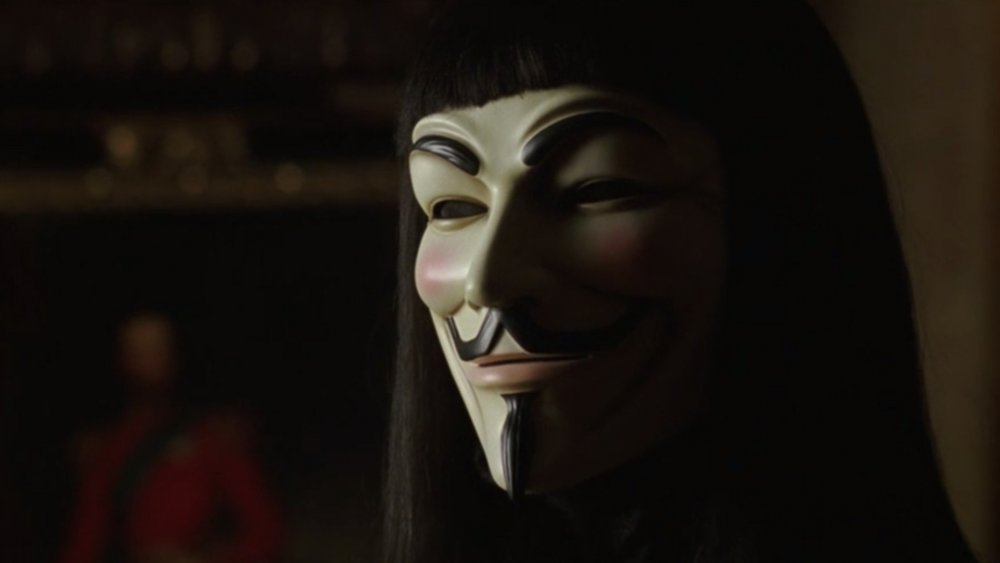The Ending Of V For Vendetta Explained
The mask worn by the hero in V for Vendetta has become iconic since it splashed across screens in 2006. The rebellious, knife-wielding hero's visage of anonymity is now synonymous with rebellion and resisting the encroachment of fascism. The film is drenched in symbolism — a fact that is masked by the blending of fast-paced action sequences and slow-motion fight choreography — which helped carry it to a relatively modest showing in theaters.
At the time of its release, V for Vendetta felt eerily dystopian in its portrayal of the government's ruling class, but in the years since its release, developments worldwide have made the movie feel alarmingly current. The script was written by the Wachowskis (best known for the Matrix trilogy) and is based on the comic book of the same name. Judging from their filmography, the siblings have a bone to pick with those in power.
V for Vendetta presents a web of timelines and viewpoints that make for a complex story to follow. Added to the story's intricacy is the main character's use of a rather verbose vernacular. While we are entertained by watching the villains dance to the hero's tune, and enthralled by the fountains of crimson red unleashed by his nimble use of the blade, many were left puzzled by the film's cryptic message. Everything converges in a final act that is truly triumphant and we're here to revel in its glory. This is the ending of V for Vendetta explained.
Remember, remember the Fifth of November
The main character, known simply as V, wears a mask based on the likeness of a man named Guy Fawkes. In V for Vendetta's opening sequence, we learn about Fawkes' foiled plan to bomb the House of Parliament in the 17th century. Seems foolish to base your identity on that of a failed rebel, but the film comes full circle. Fawkes was captured on the fifth of November and the date carries great significance — V gives us a catchy bit of rhythmic poetry to ensure the date does not leave our minds. Remember, remember the Fifth of November...
The mask's cheeky grin and stark colors implant a memorable image. At first it seems that the mask is used for anonymity, but as we learn more about V, it becomes apparent that his every word and action is full of meaning. It is not Fawkes' lack of success that is meant to be remembered, but rather his intentions. The idea of freedom that drove him to act is what we are meant to remember.
Not so dystopian
The government in V for Vendetta is run by High Chancellor Sutler, played by John Hurt (who, interestingly enough, played the victim of a similar government in the film 1984). The movie's portrayal of a controlling monarch seems less futuristic now that we are just a few clicks away from having a president sponsored by Mountain Dew. While addressing his subordinates Sutler seems to rule with authority, but his actions show that he is quite sensitive. When talk show host Gordon Dietrich (Stephen Fry) airs an unauthorized sketch making fun of Sutler, the chancellor is so upset that he destroys his glass of milk.
The controlling political party (the Norsefire Party) rose to power when a virus ravaged the UK and killed over 100,000 people. The pandemic allowed Sutler to win his election by an overwhelming majority and take control of the entire government. While the country was terrified by the threat of a virus, Sutler implemented curfews and restrictions on the general public. Fearful citizens willingly complied and slowly but surely, strict government rule became the norm. However, the human spirit is resilient, and V knows he only needs to stoke its flames.
Be careful what you think about
Throughout V For Vendetta, there are glimpses of vans rolling through the city with radio equipment plastered all over them. These vans are listening to people's conversations across town, logging them all into a database. The data gathering seems archaic compared to how it is now, when the public willingly lobs its personal thoughts into the social media ether. The data is presented to Sutler, who then instructs the news outlets regarding which stories to tell in order to shift the collective public psyche. The whole process happens at a terrifying speed.
When V hijacks the news station, the story is spun and released to the public within minutes of its conclusion, underscoring the systemic prison of the mind from which our hero is working to free the public. People can be killed and stories can be twisted, and V knows that in order to rally the people he needs to give them something more durable to latch on to — and to do this it helps to be handy with throwing knives and homemade explosives.
Be good or else the good guys will come for you
The forceful hand of the Norsefire Party is the secret police known as the Fingermen. These officers regulate the laws governing the city. They seem to work with impunity and are overrun with evil personalities. Evey (Natalie Portman) runs into two Fingermen at the beginning of the film who are set to assault her in an alley — and would have succeeded, had it not been for intervention from a masked vigilante with a robust vocabulary.
The head of the Fingermen, a man named Peter Creedy, is the right hand to High Chancellor Sutler. Not only do they subdue any political opposition, they also crack down violently on anything they see as lacking in purity. Homosexuality and the Muslim religion are among those things which result in a visit from Creedy. The gruff, remorseless commander kicks down doors and quickly smothers his victims in a black mask, after which they disappear.
Evey lost her parents to such a raid. Unfortunately she is forced to endure a similar experience at Gordon Dietrich's house. After the talk show host airs his comedy sketch poking fun of Sutler, Creedy and his men show up at his house and beat the comedian into submission, then wrap his head in a black bag before dragging him off. For citizens, the entire process is the primary source of fear for being anything but complacent in their prisons.
V's anonymity is paramount
We never see V's face throughout the entire film. The hero is played skillfully by Hugo Weaving, arguably most recognizable as Agent Smith in The Matrix trilogy. While we get bits and pieces of V's past, we never learn his true name. He uses his own power of anonymity to spread an idea throughout the population. V understands that in order for his vision of toppling the Norsefire Party to happen, the power to do so needs to be put in the hands of the people. His primary weapons are his words and a single image for people to connect with: the Guy Fawkes mask — and also knives. The self-professed vaudevillian veteran can't help but implement his flair for drama, though; the hero's acts are accompanied by beautiful roses, fireworks, and triumphant symphonies.
The closest we get to learning V's true identity is when Chief Inspector Finch (Stephen Rea) meets up with the hero and hears the whole truth — their own government, not religious extremists, manufactured a virus and unleashed it on its own citizens in order to gain control. Finch is a step behind V the whole year leading up to the Fifth of November, and his disillusionment with his own political party shows as he follows the trail.
Come watch the show with me
After V saves Evey from the Fingermen, he asks her to accompany him to a symphony. She agrees, and is startled to find that the music is accompanied by a destructive act of terrorism. V blows up the Old Bailey building, complete with fireworks and the 1812 Overture blasting across every speaker in London. News outlets quickly spin the story as a controlled demolition, with some workers blamed for the unplanned use of fireworks and music.
Luckily, the news outlet has some light security. V takes control of the emergency broadcast system and airs a message to the public, claiming responsibility for the bombing and sharing in their feelings that "there is something terribly wrong with this country." The Fifth of November is set as a date for citizens to meet at Parliament and march against the tyrannical government.
The entire act is ingenious. V doesn't beat his idea into people's minds through daily repetition like Sutler. He implants the idea and then steps back, allowing the people to process it on their own and come to their own conclusions. The idea grows over the course of a year as the people get angrier at what their country has become.
You have no fear anymore. You are completely free.
V For Vendetta dances in and out of living rooms, nursing homes, and bars across London to show the public's consumption of media and propaganda. You begin to see people's growth while the story plays out — despite not even hearing some of them speak. The primary personification for the growth of the entire population is focused on Evey. Her personal journey helps us follow the public's prison escape on a visceral, emotional level.
While Evey is trying to escape the Fingermen raid at Dietrich's house, she is snatched and black-bagged. A sobbing Evey is washed with a firehose and has all her hair cut off before she's tossed in an underground bunker where she's kept in between interrogation sessions. She stumbles across a scroll of toilet paper in her cell that has a biography written on it by another woman who was imprisoned there. The story tells of a lesbian actress who was abducted and sent to the detention center when the Norsefire Party came to power.
What she reads invigorates Evey: she stares down her interrogator, refuses to cooperate, and accepts her fate. The shadowy figure in the doorway then proclaims her to be truly free and steps back out into the hallway before vanishing, leaving the door ajar. A quick search of her prison shows that she is actually back at V's homebase, and he'd been interrogating her the whole time.
Now that you're not so scared, let's do something
While Evey is navigating her own personal transformation, the rest of the country is reaching a boiling point. V fans the flames by mailing out a Guy Fawkes mask to every person in London — hundreds of thousands of them. The packages' arrival cements the reality of his words in people's minds.
One of the personalities we come to recognize in the various London living rooms is a young girl with thick glasses who is visibly passionate about the entire movement. This girl dons one of the masks and sets out to graffiti a propaganda sign nearby. When a Fingerman spots her in the act, he shouts at her and causes the little girl to run. He draws his gun and shoots her dead in the street.
The act causes a mob of angry citizens to surround the Fingerman while he arrogantly flashes his badge and commands everyone to back away. The people of London have had enough, and a wrench to the Fingerman's skull ignites the town in a series of riots that cause Sutler to unleash a wave of military forces to subdue the public. Just as Evey is no longer too scared to act, the city's residents have also shed their fears and jump to action. The town begins to fight back against military rule while they eagerly await the Fifth of November.
X marks the spot where you die
There are a few subtle nods to V's past throughout the film, and one of its most obscure comes when he plays with Creedy's fears in order to get to Sutler. While biding his time until November, V systematically kills the staff that worked at a detention center called Larkhill — the main source of the human testing that helped create the virus. The facility's head physician has her story told through a reading of her diary. During this story we pan across several cells until we reach cell number 5 — marked in roman numerals by the letter V. Each cell before reaching V's is marked in chalk by a big X to signify the death of its occupant.
When V approaches Creedy to manipulate him into giving up Sutler, he tells the head Fingerman to signal his agreement with the plan by marking his door in chalk with an X. Nothing the hero does is without meaning. In a vague act of foreshadowing, the cruel lawman seals his own fate by marking his door.
The public needs to step up to the plate in order to ensure change, but given the circumstances, V is aware that a vacuum of power needs to be created. After a trembling Sutler is dragged out of his bunker and delivered to the cloaked hero, Creedy himself puts a bullet through the Chancellor's head. Following the act of betrayal, V reneges on their deal and kills Creedy's entire crew, then strangles the head Fingerman to death.
Ideas are bulletproof
With all those in power eliminated, the military personnel in charge of defending Parliament are left without any orders. In probably the most futuristic act of the film, they all hold steady as a mob of cloaked, Guy-Fawkes-masked citizens march towards them. The commander of the defending troops orders his soldiers to stand down once he fails to receive any orders. The mob washes over the troops and walks past them towards Parliament.
After his final confrontation, a bloodsoaked V stumbles back to the subway platform where he last talked with Evey and collapses. He bleeds out in her arms, leaving Evey with a train full of explosives and a lever. She places his body on the train and somehow finds a large amount of roses to lay around his body in memoriam. Chief Inspector Finch finally catches up to them and steps on to the platform with his gun half-heartedly aimed. The final choice to set themselves free is left up to Finch and Evey.
Evey refuses to stand down. Finch lowers his gun and lets her pull the lever. V's death does not dampen his flair for drama. Once again, a symphony blares across the city's loudspeakers as the camera pans across a city center packed shoulder to shoulder with his likeness. He delivers on his word and Parliament erupts in a plume of rubble as the explosives arrive at its foundations. Fireworks light up a sea of people who all remove their masks one by one, revealing those we have connected with throughout the story. It is at this climactic ending of V For Vendetta that the importance of V's anonymity becomes apparent.
He was all of us
By never revealing his identity, V left no single person to connect to the idea. All that was left was the idea itself. The lack of personification gave it more life than it could have ever had with a face. It allowed the interpretation of the idea to exist in its own unique way within every single person. Its immortality is put on display during the film's ending, when those that have died are revealed beneath several Guy Fawkes masks.
People can change, but you can't make it happen for them. They have to do it themselves. V assembled a set of circumstances that allowed for just that. He removed the blinders and obstacles to allow the country to pull itself up all on its own. The people had the power to do it themselves — they just needed some help. And a little gunpowder, treason, and plot.
